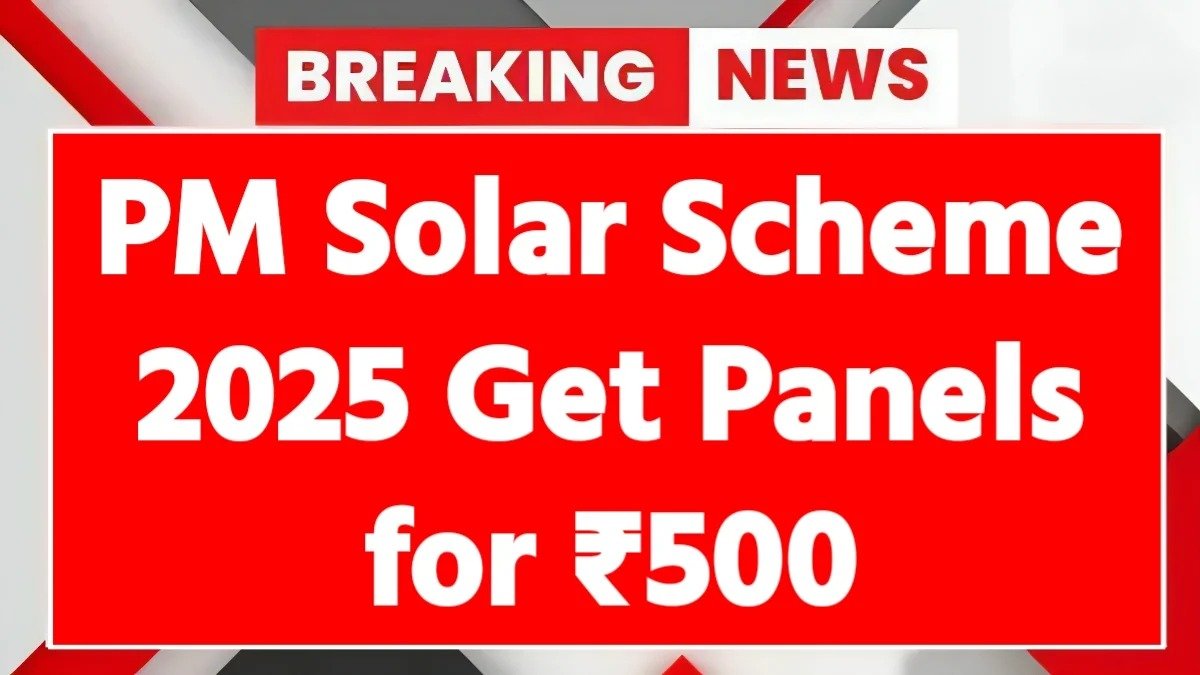PM Solar Panel Scheme 2025 : India’s government has launched a groundbreaking initiative to revolutionize renewable energy accessibility through the PM Solar Panel Scheme 2025. This comprehensive program is designed to bring rooftop solar installations within reach of every Indian household, particularly targeting rural communities and low-income families struggling with soaring electricity costs and unreliable power supply. Through this remarkable scheme, qualified applicants can secure solar panel installations for an incredibly affordable upfront payment of merely ₹500, making sustainable energy solutions more attainable than previously imagined. This initiative arrives at a crucial moment when nationwide electricity demand continues climbing, prompting families to seek sustainable alternatives for managing escalating monthly energy expenses.
Beyond immediate cost savings, the PM Solar Panel Scheme represents India’s unwavering dedication to environmental conservation and sustainable development. Through incentivizing residential and agricultural solar adoption, the government aims to decrease reliance on fossil fuel-generated electricity while advancing toward an environmentally conscious future. This program delivers dual benefits encompassing both financial advantages and ecological improvements. Participating households can potentially eliminate their electricity expenses entirely, while the nation advances toward complete energy self-sufficiency. Through generous subsidies, streamlined application processes, and concentrated support for rural communities, this scheme has captured widespread attention throughout the country.
Understanding the PM Solar Panel Scheme 2025
The PM Solar Panel Scheme 2025 represents a transformative government program engineered to fast-track rooftop solar adoption nationwide. The initiative delivers substantial financial assistance covering the majority of installation expenses, enabling citizens to transition to clean energy without experiencing financial hardship. This comprehensive program benefits both metropolitan and rural households equally, providing significant relief from escalating electricity rates. Additionally, the scheme advances national objectives for expanding renewable energy infrastructure to fulfill environmental and climate obligations.
This program distinguishes itself through promoting household energy independence. Families installing solar systems can produce and utilize their own electricity supply, and based on system capacity and usage patterns, may completely eliminate monthly electricity bills. Solar power generated throughout daylight hours provides immediate consumption, with surplus energy storable through battery integration. For isolated regions experiencing inconsistent grid connectivity, this initiative delivers dependable and sustainable power alternatives.
Advantages for Households and Agricultural Communities
The most significant benefit of the PM Solar Panel Scheme 2025 lies in its exceptional affordability. With government subsidies covering substantial installation costs, thousands of families stand to benefit tremendously. Households can potentially save up to ₹6000 monthly on electricity bills, depending on solar system size and consumption habits. For countless families, this translates to sustained financial relief and protection against increasing power tariffs. The program also guarantees consistent electricity supply during peak demand periods when grid systems may experience instability.
Agricultural communities receive particularly valuable benefits from this scheme. Solar energy can power irrigation systems and various farming equipment, while farmers possessing adequate land can establish larger solar installations generating substantial electricity volumes. Every 5 acres can support solar configurations producing up to 1 megawatt capacity, which can be sold to state electricity boards. This creates additional revenue opportunities for farmers while supporting national renewable energy goals. Through solar installations, agricultural operations reduce dependence on diesel generators and grid supply, creating more economical and sustainable farming practices.
Qualification Criteria and Required Documentation
Applicants for the PM Solar Panel Scheme 2025 must maintain Indian residency and possess residential property or agricultural land suitable for installation purposes. Households and farmers require sufficient rooftop space or open areas to accommodate solar panel systems. Priority consideration goes to families qualifying under low-income or rural classifications, as the program focuses on expanding solar accessibility to underserved populations. The government emphasizes applications must be submitted exclusively through official channels to prevent fraudulent activities.
Essential documentation includes Aadhaar Card, PAN Card, ration card or alternative identity verification, land ownership papers for agricultural applicants, banking account information, passport-sized photographs, and contact information including telephone numbers and email addresses. Submitting accurate information ensures expedited processing and approval. Applicants should also prepare electricity connection details to determine appropriate system capacity matching their consumption requirements.
Application Procedures and Installation Standards
Candidates may submit PM Solar Panel Scheme 2025 applications through official websites by completing online forms and uploading required documentation. Following submission, applicants receive registration or acknowledgment numbers for tracking purposes. Individuals preferring offline submission can visit nearby energy department offices or Kusum Yojana centers for assistance. After verification and approval, beneficiaries receive installation scheduling information and vendor coordination details.
The government has designated authorized companies and agencies for installation services ensuring quality standards and safety protocols. Users must avoid private intermediaries to prevent fraud. Prior to installation, households should verify rooftop areas receive adequate daily sunlight without significant shading from structures or vegetation. Upon installation completion, beneficiaries receive system documentation, performance specifications, and warranty information. Regular maintenance and periodic system inspections are recommended for optimal energy production and long-term reliability.
Disclaimer: This article serves informational purposes exclusively. Readers should visit official government websites or contact authorized offices for comprehensive eligibility requirements, application procedures, and current guidelines. We accept no responsibility for changes, fraud, or misinformation concerning this scheme.
Frequently Asked Questions
Q: What is the upfront cost for solar panel installation under this scheme?
A: Eligible citizens can install solar panels for just ₹500 upfront due to substantial government subsidies covering most installation costs.
Q: How much can households save on monthly electricity bills?
A: Households can save up to ₹6000 per month on electricity expenses, depending on the solar system size and their consumption patterns.
Q: What documents are required for application?
A: Required documents include Aadhaar Card, PAN Card, ration card, land ownership documents (for farmers), bank account details, passport-size photograph, and contact information.
Q: How can farmers benefit from this scheme?
A: Farmers can power agricultural equipment with solar energy and install larger systems to generate electricity for sale to state electricity boards. Every 5 acres can support up to 1 megawatt of solar power generation.



